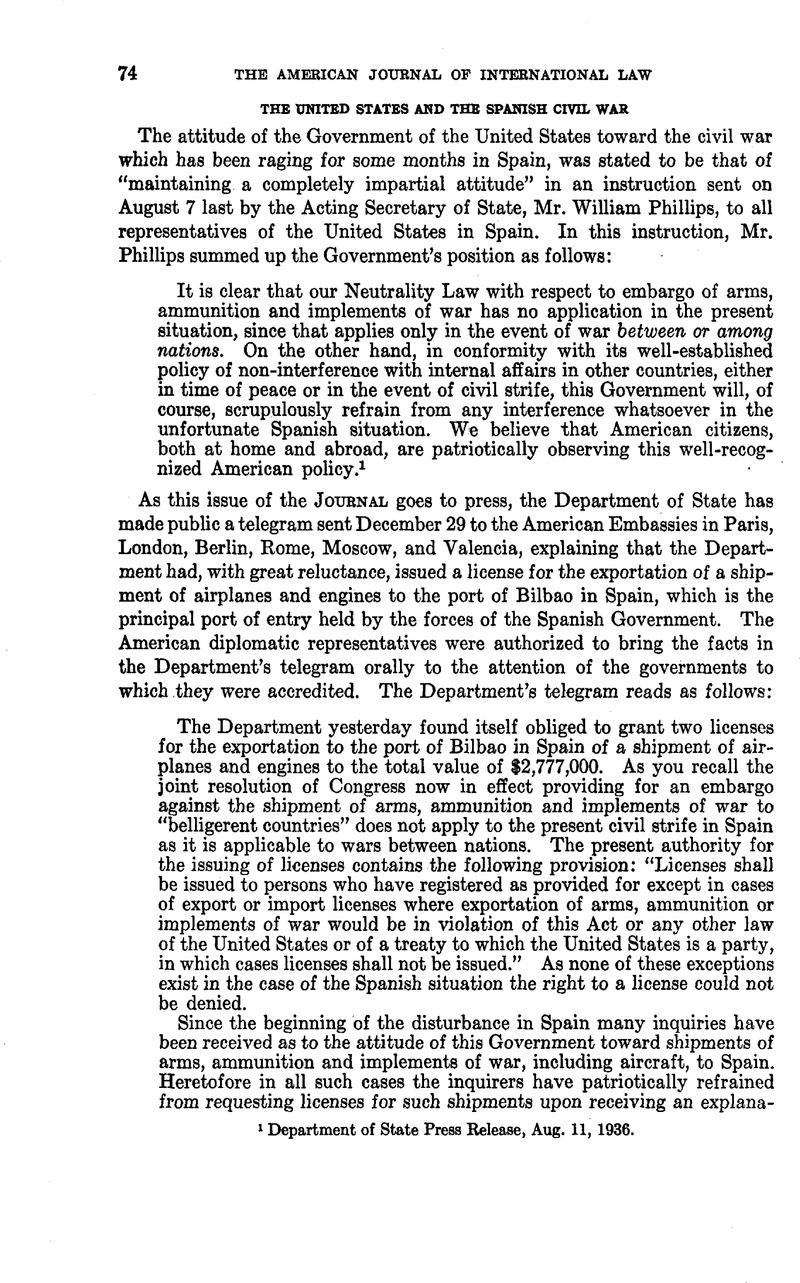No CrossRef data available.
Published online by Cambridge University Press: 12 April 2017

1 Department of State Press Release, Aug. 11, 1936.
2 State Dept. Press Release, Dec. 30, 1936. On Jan. 5 the State Department made known that it was obliged to grant licenses to another exporter to ship war supplies valued at $4,500,000 to the port of Valencia, in the control of Spanish Government forces. Washington Post, Jan. 6, 1937.
3 See, for example, the English author, Hall, , International Law (8th ed.), pp. 515–16.Google Scholar
4 The Code of Laws of the United States of America in force Jan. 3, 1935, Title 22, Chap. 5.
5 On January 6, 1933, Secretary Stimson recommended that Congress be requested to “confer upon the President authority in his discretion to limit or forbid, in cooperation with other producing nations, the shipment of arms and munitions of war to any foreign State when in his judgment such shipment may promote or encourage the employment of force in the course of a dispute or conflict between nations.” In support of this recommendation Secretary Stimson added: “There are times when the hands of the Executive in negotiations for the orderly settlement of international differences would be greatly strengthened if he were in a position in cooperation with other producing nations to control the shipment of arms. The United States should never, in justice to its own convictions and its own dignity, be placed in such a position that it could not join in preventing the supply of arms or munitions for the furtherance of an international conflict while exercising its influence and prestige to prevent or bring to an end such a conflict.” (Senate Document No. 169, 72d Cong., 2d seas.) President Hoover transmitted this recommendation to Congress on January 10, 1933, but all general legislation on this subject failed until the enactment of the Neutrality Law of Aug. 31, 1935. For a summary of the action of Congress on President Hoover’s recommendation, see Editorial Research Reports, 1933, Vol. 1, pp. 344–348.
6 The Joint Resolution of May 28, 1934, reads as follows:
“That if the President finds that the prohibition of the sale of arms and munitions of war in the United States to those countries now engaged in armed conflict in the Chaco may contribute to the reestablishment of peace between those countries, and if after consultation with the governments of other American Republics and with their cooperation, as well as that of such other governments as he may deem necessary, he makes proclamation to that effect, it shall be unlawful to sell, except under such limitations and exceptions as the President prescribes, any arms or munitions of war in any place in the United States to the countries now engaged in that armed conflict, or to any person, company, or association acting in the interest of either country, until otherwise ordered by the President or by Congress.”(U. S. Statutes at Large, Vol. 48, Pt. 1, p. 811.)
7 Department of State Press Releases, May 26, 1934, pp. 301–303.
8 Printed in this JOURNAL, Supp., Vol. 30 (1936), p. 58. The Joint Resolution of Feb. 29, 1936, amending and extending the law, is printed in the same volume, p. 109.
9 Dept. of State Press Releases, Oct. 5, 1935, p. 255.
10 Dept. of State Press Releases, Nov. 2, 1935, p. 338.
11 Ibid., Oct. 10 and 30, 1935, pp. 303, 339.
12 See texts in L’Europe Nouvelle, Sept. 26, 1936, Supplement. English texts of German and Italian replies are in the London Times, Aug. 19 and 22, 1936, and the Portuguese reply is in the London Times, Sept. 11, 1936.
13 Ibid., Aug. 15, 1936, p. 11.
14 See British Parliamentary Command Papers, No. 5300.
15 Washington Post, Dec. 31, 1936, and Jan. 6, 1937. The replies of Germany and Italy to the new Franco-British proposals to curb the flow of foreign volunteers to Spain are printed in the New York Times, Jan. 8, 1937, p. 8. These governments reiterate the attitude taken in their replies to the original French proposal last August.
16 United States Statutes at Large, Vol. 30, p. 739.
17 For President Theodore Roosevelt’s proclamation see Messages and Papers of the Presidents, Vol. XIV, p. 6968.
18 The law as it now stands America, Title 22, Chap. 5, Sec. 236.
19 See Editorial Research Reports, “Arms Embargoes and the Traffic in Munitions,” Vol. I, 1933, No. 18, pp. 342–344.
20 New York Times, Feb. 14, 1917, p. 1.
21 Ibid., Mar. 24, 1927, p. 1.
22 Ibid., Dec. 30, 1923, p. 1.
23 New York Times, Mar. 24, 1927, p. 1.
24 President Harding’s letters are in the New York Times, Dec. 30, 1923, p. 15.
25 Department of State Publication No. 787, p. 17.
26 Proclamation in Dept. of State Press Releases, April 18, 1936, pp. 311–313.
27 Public Resolution No. 1, 75th Cong., 1st Sess.